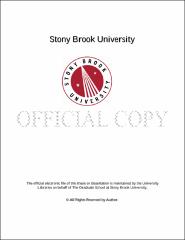| dc.identifier.uri | http://hdl.handle.net/11401/77759 | |
| dc.description.sponsorship | This work is sponsored by the Stony Brook University Graduate School in compliance with the requirements for completion of degree. | en_US |
| dc.format | Monograph | |
| dc.format.medium | Electronic Resource | en_US |
| dc.language.iso | en_US | |
| dc.publisher | The Graduate School, Stony Brook University: Stony Brook, NY. | |
| dc.type | Thesis | |
| dcterms.abstract | The combustion of fossil fuels is increasing atmospheric CO2 concentrations and, in turn, acidifying and warming world oceans. A further consequence of warming oceans may be declines in the abundance of plankton. Some of these changes can already be observed in coastal oceans and may affect marine biota including forage fish which play a key role in marine food webs as key consumers of primary production and prey of fishery species. While these climate change stressors have previously been shown to negatively affect the performance of larval fish, the interactive effects of these multiple stressors on fish have yet to be explored. This thesis presents a series of experiments that examined the effects of changing temperature, pCO2, and food levels on the growth and survival of early life (embryo and larval) stages of two species of forage fish indigenous to the Northwest Atlantic Ocean, Menidia beryllina and Cyprinodon variegatus. These two fish species are a useful comparison as they lay pelagic and demersal eggs, respectively, and have been previously shown to be vulnerable and resistant to ocean acidification, respectively. Temperature had the strongest effect on the hatching rate, hatching success, survival, and growth of both fish species with higher temperatures yielding more rapid hatching and higher and lower temperatures leading to reduced growth and survival. In contrast, pCO2 and food levels had no effects on hatching, but elevated pCO2 and reduced food supplies significantly reduced the survival of larval M. beryllina. There were synergistically negative effects of elevated temperature and elevated pCO2 as well as low food supply and elevated pCO2 on larval fish. For example, larvae that were resistant to high pCO2 experienced elevated mortality when high pCO2 was experienced outside their thermal optimum. In other cases, elevated pCO2 resulted in smaller larvae at high, but not optimal, temperatures. Furthermore, larvae that were fed ad libitum were resistant to high pCO2 but experienced elevated mortality when exposed to high pCO2 and given a restricted diet. Such interactions evidence the importance of simultaneously considering effects of multiple stressors on larval fish rather than their individual effects as these outcomes could not have been predicted by observing each stressor individually and these stressors co-occur in estuaries. Collectively, this thesis demonstrates that the effects of multiple climate change stressors may interact to synergistically suppress the productivity of fisheries shallow coastal ecosystems. It is anticipated these effects will intensify through this century due to the intensification of climate change. | |
| dcterms.available | 2017-09-20T16:53:31Z | |
| dcterms.contributor | Gobler, Christopher J | en_US |
| dcterms.contributor | Lopez, Glenn | en_US |
| dcterms.contributor | Frisk, Michael G | en_US |
| dcterms.contributor | . | en_US |
| dcterms.creator | Merlo, Lucas R. | |
| dcterms.dateAccepted | 2017-09-20T16:53:31Z | |
| dcterms.dateSubmitted | 2017-09-20T16:53:31Z | |
| dcterms.description | Department of Marine and Atmospheric Science | en_US |
| dcterms.extent | 51 pg. | en_US |
| dcterms.format | Application/PDF | en_US |
| dcterms.format | Monograph | |
| dcterms.identifier | http://hdl.handle.net/11401/77759 | |
| dcterms.issued | 2016-12-01 | |
| dcterms.language | en_US | |
| dcterms.provenance | Made available in DSpace on 2017-09-20T16:53:31Z (GMT). No. of bitstreams: 1
Merlo_grad.sunysb_0771M_12957.pdf: 477457 bytes, checksum: a8d4906d3b73f79d0d6a399f3f2032cd (MD5)
Previous issue date: 1 | en |
| dcterms.publisher | The Graduate School, Stony Brook University: Stony Brook, NY. | |
| dcterms.subject | Climate Change, Cyprinodon variegatus, Larval development, Menidia beryllina, Ocean Acidification | |
| dcterms.subject | Climate change | |
| dcterms.title | The interactive effects of acidification, temperature stress, and food supply on the growth and survival of the forage fish, Menidia beryllina and Cyprinodon variegatus | |
| dcterms.type | Thesis | |

